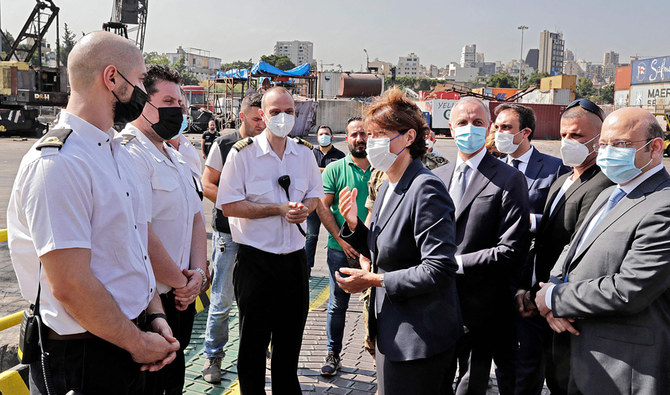BEIRUT: Shortages and the currency crunch in Lebanon could lead to a collapse of the main water supply in Lebanon within weeks, UNICEF has warned.
“More than 4 million people, including 1 million refugees, are at immediate risk of losing access to safe water in Lebanon,” it said.
Yukie Mokuo, UNICEF representative in Lebanon, said the water sector was being “squeezed to destruction by the current economic crisis.”
“A loss of access to the public water supply could force households to make extremely difficult decisions regarding their basic water, sanitation and hygiene needs.”
Officials believe the water sector was “unable to function due to the dollarized maintenance costs, water loss, the parallel collapse of the power grid and the threat of rising fuel costs.”
With the rapidly escalating economic crisis and shortages of funding, fuel and supplies such as chlorine and spare parts, UNICEF estimates that most water pumping will gradually cease across the country in the next four to six weeks.
BACKGROUND
Lebanon is experiencing a shortage of essential fuel as the Banque du Liban’s dollar reserves are depleted.
It fears that if the public water supply system collapses water costs could rise by 200 per cent a month to secure water from alternative or private water suppliers.
The UNICEF warning comes at a time when diesel supplies have reached an all-time low.
Protesters have blocked public roads because of diesel shortages, which might threaten health services and food supplies.
The shortages could lead to protests in vital sectors that depend on diesel for generating electric power.
Generator owners meeting in Greater Beirut announced that “they will shut down their generators until they can secure diesel fuel at the official price.”
People were subjected to darkness recently when the owners of the generators began harsh generator cuts due to diesel shortages.
Lebanese life “has returned to the Stone Age,” activists quipped on social media.
Since the end of 2019, Lebanon has faced an unprecedented economic collapse, which the World Bank classifies as “among the worst in the world since the mid-19th century.” More than half of Lebanon’s population is below the poverty line.
Lebanon is experiencing a shortage of essential fuel as the Banque du Liban’s dollar reserves are depleted, although it has lifted subsidies on dozens of items. The bank also delayed the opening of import credits.
For nearly a year, political parties have not been able to agree on the formation of a government that can save the country through reforms required by the international community to help the country.
The Directorate General of Oil affiliated to the Ministry of Energy urged fuel companies on Friday to “allocate quantities of their diesel stocks to meet the needs of hospitals to prevent any humanitarian disaster.”
The directorate called on the central bank to have mercy on the country and citizens and speed up the opening of diesel oil credits with gasoline and diesel levels reaching red zones.
The Lebanese Army gave hospitals some of their diesel stockpiles last week.
“The diesel crisis is very big and opening credits is no longer enough to cater for the market’s needs,” said George Brax, a member of Gas Station Owners’ Syndicate.
He stressed that the solution would be to remove subsidies once and for all, as has happened for some medicines and industrial goods.
Brax feared reaching a stage when “we will not be able to import fuel anymore.”
Residents of buildings in upscale neighborhoods in Beirut told Arab News that they had resorted to buying diesel on the black market so that they could light their homes and refrigerators even if this was at great cost.
However, some decided to reduce energy consumption so that diesel stocks could last longer.
The Supermarket Owners’ Syndicate warned against “diesel outages because many food items need refrigerators and relatively low temperatures. Power outages will inevitably harm food safety.”
Hani Bohsali, head of Syndicate of Food Importers in Lebanon, feared that “people will resort to eating cereals and canned food only because we have already reached rock bottom.”
The Syndicate of Bakery Owners warned that resorting to the black market for diesel supplies would raise the price of the bread.
It called on the General Directorate of Oil to avoid the crisis and secure diesel for bakeries before Monday. Otherwise, the bakeries would be forced to close their doors, the syndicate said.
The growing black market, without any effective official sanction, has spread to medicine as well, as pharmacies intermittently strike to protest against the failure to import medicines.
The importers in turn are waiting for the central bank to settle the previous bills with pharmaceutical companies abroad.





























